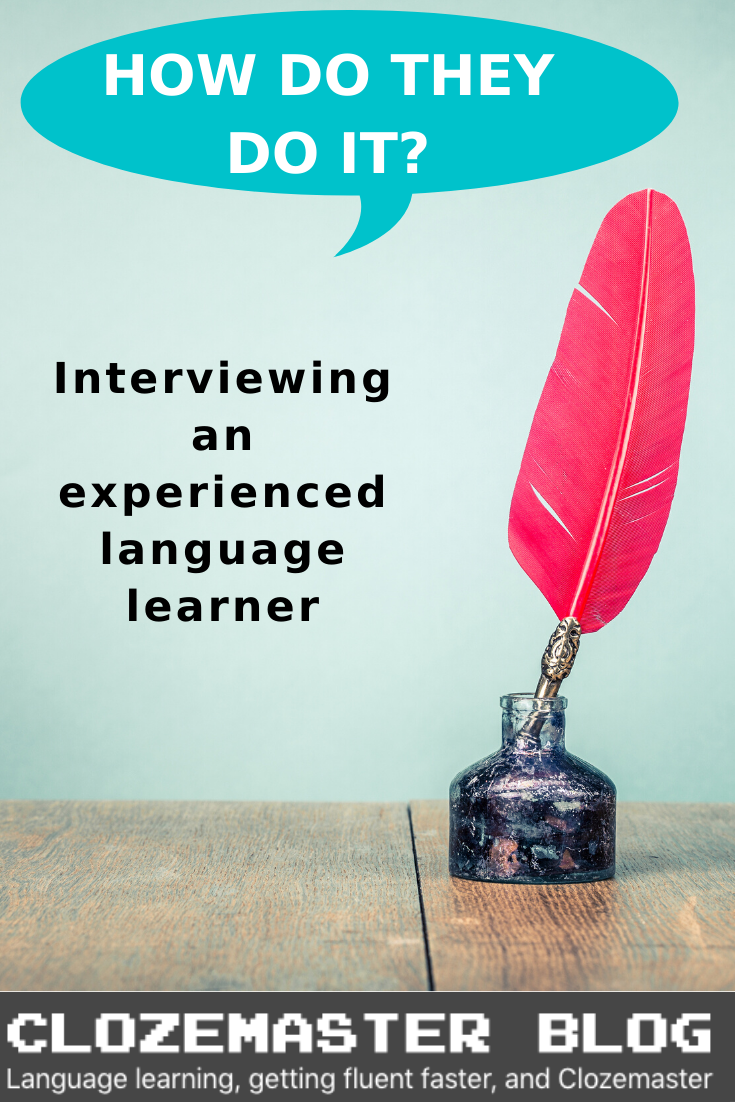
John Fotheringham, also known as the founder of Language Mastery, the author of Master Japanese and Master Mandarin, and the developer of a language-learning method to help people reach their goals, particularly in Japanese and Chinese, has kindly agreed to sit down with us and indulge in a few questions. He’s sure got some interesting views, so let’s have a peak into his mind and understand how he thinks about language learning.
Note: If you like learning from the experts, make sure you check out these language learning tips from polyglots around the world.
You seem to be an expert in Japanese and Chinese. How did that come about?
I wouldn’t call myself an “expert” in either language, but I am intensely curious in both languages and cultures, and whatever competence or expertise I have is the direct product of this curiosity.
What do you attribute to your language learning success?
Many assume that learning a foreign language rests on ability, but based on my experience learning and teaching languages over the past twenty years, and interviewing dozens of polyglots and hyper-polyglots for The Language Mastery Show, I firmly believe that the true key to learning one or multiple foreign languages is having sufficient passion, interest, and curiosity, not a supposed “language gene” or a “gift” for languages.
Is there something special about the way you learn languages, and about the way you teach them to others?
My approach to learning and teaching languages is certainly not unique, but it does differ significantly from that taken in traditional classroom- and textbook-based language education. Most language courses and teachers make the mistake of assuming that languages are “taught, not caught,” when the exact opposite is in fact true. We acquire languages naturally and automatically when we get sufficient exposure and practice, not through conscious memorization and study. A little vocab or grammar study can help adult learners, but the primary focus should be flooding oneself with interesting, comprehensible input (listening and reading) and getting as much output practice (speaking and writing) as possible. The good news is that modern learners have more chances than ever to practice all four language skills no matter where in the world they live. With podcasts, streaming video, online tutors, etc., we can now immerse ourselves in our target language anywhere in the world.
Can you tell us a bit about the language books you’ve written?
I wrote Master Japanese and Master Mandarin as how-to manuals for independent language learners. Both books provide step-by-step instructions for creating immersion environments anywhere in the world, choosing the right methods and tools, avoiding overwhelm and analysis paralysis, mastering all four language skills, increasing and sustaining motivation, and conquering fear (especially around speaking and making mistakes).
What other languages have you learned?
I have dabbled a little in French, Spanish, and Bengali, and would also like to learn Korean, Portuguese, and Russian.
What makes up your language learning routine?
I try to get a balance between all four skills by listening to foreign language podcasts, watching foreign language movies and shows on Netflix using the Language Learning with Netflix extension for Chrome, reading foreign language blogs and books, speaking with tutors on iTalki, writing in my Bullet Journal and the Day One app, and getting my writing corrected.
How important is learning a language in context?
Very! In fact, it’s not just important, it’s mandatory. We only learn when we understand, and we cannot understand without context.
Speaking of context, it’s also important to closely match your language learning environment to the one in which you aim to use the language. We get better at what we practice, so we should aim to directly practice the skills we want to improve. Want to get good at speaking Japanese? Then you have to actually speak Japanese with native speakers.
How important is it to practise all skills (reading, writing, listening, speaking) as opposed to just one or two?
It all depends on one’s personal WHY for learning the language. Personally, I find the most benefit and enjoyment from learning all four skills, but there is nothing wrong with focusing on just listening and speaking (especially in the beginning).
You have previously recommended Clozemaster to your followers. Why do you think Clozemaster is a useful tool for language learning?
There’s a lot to like about Clozemaster. It helps learners see how words are used in context, and focuses on phrases, chunks, and sentences instead of isolated vocabulary.
How do you recommend people to use Clozemaster to get the most out of it?
I find the Cloze-Listening exercises most effective, especially using the text-input option. This way, you can strengthen both your listening and reading skills, and also engage in active production instead of just passive recognition. This is especially important for languages like Japanese and Chinese in which you might be able to recognize certain Chinese characters but don’t know how to pronounce or write them. By having to write the words out on your smartphone screen using handwriting input, you better assess and strengthen your active vocabulary.
Wow, it’s great to hear from such a passionate and motivated person. What did you get from John’s words that you can apply to your language learning routine? Or do you have any tips he didn’t mention? Share with us in the comments!
Learn languages in context with ClozemasterClozemaster has been designed to help you learn the language in context by filling in the gaps in authentic sentences. With features such as Grammar Challenges, Cloze-Listening, and Cloze-Reading, the app will let you emphasize all the competencies necessary to become fluent in your target language. |


